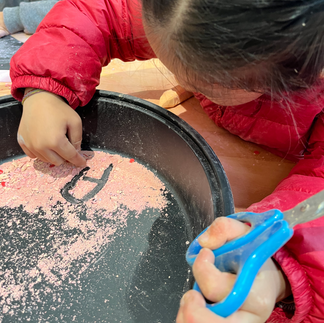Don’t hold them back or drag them along!
- Joshua Barr (M.A. M.Ed)
- Nov 26, 2022
- 3 min read
Recently the kindergarten I'm principal of received a visit from the EBD inspectors assigned to our school. Essentially the Ofsted inspectors of China. A few times I have talked about China's education policy with regards to the early years and how it is very much focused on meaningful experiences, play and a rejection of push down teacher directed instruction of the primary curriculum. I have written many times about the dangers of trying to use a heavily teacher directed approach in kindergarten but this recent visit had me realizing some of the dangers of the reverse model.
China's K-1 transition makes some very clear policies about what should be happening in kindergarten and what shouldn't as well as outlining that the transition to primary school is a two way process and not simply the job of kindergarten. For example,
(Translated from China's K-1 Transition Documents)
"The first semester of the first grade of primary school, as a period of adaptation for young children, should pay attention to the physiological and psychological needs of new students, create a class environment connected with kindergartens, appropriately adjust work and rest arrangements..."
"It is not appropriate to require young children to learn to write in advance, when children have spontaneous writing behavior... it is not appropriate to carry out mechanical training, nor should it simply judge whether the writing is right or not, whether it is good or not, and focus on protecting the interest of young children in writing and drawing"
"Kindergarten should not one-sidedly pursue one or more aspects of preparation, let alone use the advance learning and intensive training of primary school knowledge and skills to replace comprehensive preparation."
When our EBD visitors came they wanted to see our oldest class, the ones of who will go to grade 1 next year. They observed the class for around an hour then gave some feedback. Some of the feedback and questions included;
Why do you have writing pencils in the classroom? Are you teaching primary school style?
There are Chinese character writing guides on the wall. You shouldn't be teaching primary school curriculum.
We have writing pencils in all the classrooms not for worksheets or writing training but so children have a number of mark making tools at their disposal. The reason why this class had Chinese character guides on the wall is they have some students who are already reading and writing Chinese through their own development and home education. Here lies the potential danger of how some define "play based pedagogy" or "appropriate developmental learning". We want to avoid dragging children along a rigid academic curriculum that focuses on cookie cutter activities, worksheets, memorization and repetition. In a play based pedagogical approach we also want to make sure we don't hold children back and stop them from pursuing things they are interested in and ready for in the name of "that's primary school curricula you can't do that".

Play based learning and academic learning are often placed in an either or situation. You can be play based or academic. I don't agree! Play based learning should be very academic if we understand it as continued learning, progression and pursuit of ones curiosity towards a deeper understanding. What we want to avoid is the whole group herding towards one goal, learning discrete skills out of context and in isolation towards learning that is relevant, sticky and of interest to the child(ren).
For example, when it comes to the teaching of letters and sounds we should accept the research that indicates earlier isn't better/it offers long term advantages. I also believe good teachers continually test theories about children's interests in such things and be prepared to begin such professional and targeted support along with the pre-literacy skills great teachers do/should do in the early years before getting to formal reading and writing instruction, which is grade 1 in China (6-7 years of age).
When we observe a three year old accurately writing her name in chalk dust the play based educator should plan and take active steps to cater to her unique readiness and development.
In a previous article I wrote about, 'What's Next?', I discuss the importance of taking children's play, ideas, thought processes, skills and knowledge further. It is not easy but it does provide both the teacher and child with the tools to be truly life long learners. We should avoid falling into the either or mentality where half of us are trying to drag children through an intense rigid curriculum and the other half are saying children shouldn't do that as it belongs to primary school.
Don’t hold them back or drag them along!











Comments